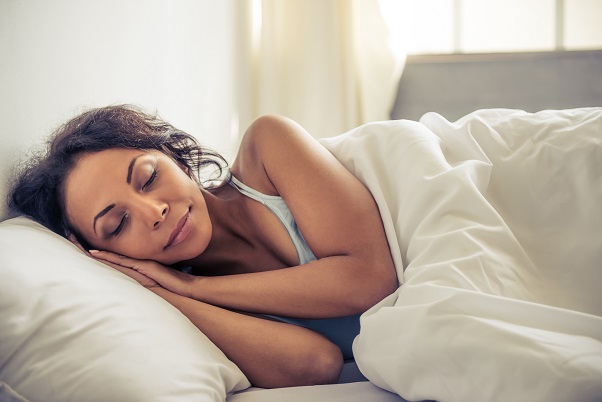Sleep is incredibly important to your health, happiness and productivity. But quality of sleep matters just as much as the number of hours you spend in bed. Many Americans toss and turn, struggling to get a good night of sleep. What you may not realize is that your home’s HVAC system can have a significant impact on the quality of your rest. In fact, a good HVAC system can greatly impact the quality of your sleep and improve those all-important REM sleep hours.
Temperature
The temperature in your bedroom can play a significant role in how well you sleep at night. While there is no specific temperature that will work for everyone, the National Sleep Foundation cites that the ideal sleeping temperature for most adults is 60-67 degrees Fahrenheit and 66-70 degrees Fahrenheit for elderly people and babies. That may sound rather chilly, but our body’s internal thermostat sets itself a few degrees lower when it is time to fall asleep. This means that a cooler external temperature feels more comfortable to us. And it can help us fall asleep faster.
Regardless of recommended thermostat settings, you will need to find the temperature, ideally within that range that makes you comfortable. If you have concerns about your heating or cooling bill, try alternatives to keeping warm or cool at night that do not involve your thermostat. For example, replace the comforter with a thin blanket during the hot months and add extra blankets when the temperature drops in the winter.
Humidity
The stuffy feeling you get in summer or the dryness you feel in winter are all a result of poor humidity control. Talk to your HVAC contractor about having a humidifier or dehumidifier unit added to your HVAC system to maintain healthy humidity levels, especially at night.
Light
If your bedroom houses any components of the HVAC system, the lights from these units can make it hard to sleep as well. A thermostat typically has glowing lights on it, while a smart thermostat might have a lit-up screen that shines too much light in your bedroom.
Cover any of these components before you go to bed to prevent the light exposure from impacting your body’s natural sleep patterns.
Noise
A noisy HVAC unit might not only prevent you from getting a good night of sleep. It can also indicate a problem with it. If the rattling, hissing and squealing noises coming from your unit are keeping you up through the night, it might be time to have it checked by an HVAC professional. These sounds can mean anything from a loose part to a leaking air duct. The sooner you repair the issue, the less damage you’ll sustain.
Indoor Air Quality
The quality of the air you breathe can also play a major role in how well you sleep and how you feel when you wake up each morning. Poor indoor air quality is a growing problem across the nation. Your HVAC system recirculates air several times per run cycle, which means you could be breathing in dust, dirt, pollen, pet hair, dander, and other debris. Common symptoms of poor indoor air quality include congestion, sore throats, eye irritation, and headaches. You can combat the problem by having an HVAC technician clean out your ducts regularly. This service is beneficial to both your health and your wallet, as it can help your heating and cooling system operate more efficiently.
Final Thoughts
Keeping your heating and air conditioning running well is a big factor in getting a good night’s sleep. Let our HVAC experts at Aire-Tech explain the important role your HVAC system plays in sleep quality and offer you tips on how you can optimize your system for better rest.
If your system needs repair or inspection before winter, call Aire-Tech on 951-926-1002. You can also visit our Contact page and complete the contact form.

